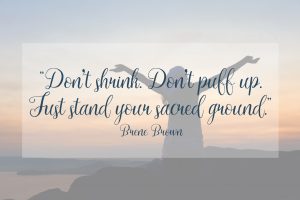hearing the truth in love
“Speak the truth in love,” Paul teaches us. This is part of a larger point: not only are we to “speak the truth in love,” we are to “live a life of love” (Eph. 5:1). Paul is teaching us how to live a profoundly new life. So think about the flip side of speaking the truth in love. To live a new life of love, doesn’t it follow that we are to also “hear the truth in love”?
What does that mean?
Well, I know what the opposite is; it is “hearing the truth through defensiveness.” No one had to teach me that, I just picked it up.
It is like an automatic response. My wife says, “…about your interaction with our son…” Instantly, my walls shoot up, my mind races ahead, and I search for strategies to make it seem like I am receiving her feedback when really I am deflecting it.

I might interrupt and say, “Yeah, I’ve already thought about that…yeah, I was a little harsh…” This strategy seeks to beat her to the punch. Maybe she won’t finish on account of my “I-already-thought-of-that” response. If that doesn’t work, I can always resort to self-deprecating: “Well, I’m just a loser of a father.” Neither strategy is designed by love, but by fear.
Or I might stockpile reasons why my response to my son was justified. I might blame him (“Well, he was being disrespectful.”), I might blame her (“Well, we’ve tried it your way, now haven’t we?”), or I might even blame the cosmos (“What am I supposed to do?!”). I will desperately do anything at this point, anything but openly receive feedback.
It is like I can’t believe that feedback —even loving feedback—could be good for me. It is as if feedback will dismantle some vital sense of self. I must defend myself or else…or else…well, I don’t know what else…but it will be bad. I don’t actually know what will happen because I so rarely open myself to loving truth.
We have trouble with hearing truth precisely because we don’t hear it through love. Instead we hear it through fear. I am afraid of what my wife might see about my interaction with my son. I am afraid I will have to change. I am afraid I won’t be understood. I listen defensively because I am afraid for that vital sense of self.
This sort of fear distorts everything, no matter how well it is said. Yes, the speaker has a responsibility to frame their delivery “in love,” but the hearer also has the responsibility to “listen in love.” This changes my whole stance. If I love my wife, I will try to get at what she wants to convey. If I love my son, I will welcome help on how to grow that love.
Listening in love doesn’t mean that I’m wrong about everything. My son may have been disrespectful, my wife’s way may not be totally effective either, but listening in love grows me to be respectful and helps me to be effective. I begin to hear my wife’s heart, my son’s heart, whether they communicate well or not. If I can hear the heart, then maybe I won’t react in such fear by either attacking or avoiding. And when I hear the heart maybe I can respond in love, whether it is tough or tender.
Listening in fear distorts everything; listening in love clarifies everything.
But one more point: to listen in love means that you must listen through the filter of being loved. This is Paul’s whole point about the new life: God loves you and therefore your vital sense of self is safe. You can’t hear through fear, but your new life is vouchsafed in God. When you are vitally loved, you can vitally live.
You might even become that rare listener who can actually hear what people are trying to say, despite how they are saying it.
 Roger Edwards joined The Barnabas Center in 1991. He works with both with individuals and couples, helping people confess their need and embrace their available choices to lead healthier lives. Roger also teaches and leads discussion groups and retreats applying the Gospel to everyday life. He is a licensed professional counselor (LPC), holds a master’s degree in biblical counseling from Grace Theological Seminary in Indiana and earned a bachelor’s degree in engineering from the University of North Carolina at Charlotte. He is married to Jean and they have seven children and nine grandchildren.
Roger Edwards joined The Barnabas Center in 1991. He works with both with individuals and couples, helping people confess their need and embrace their available choices to lead healthier lives. Roger also teaches and leads discussion groups and retreats applying the Gospel to everyday life. He is a licensed professional counselor (LPC), holds a master’s degree in biblical counseling from Grace Theological Seminary in Indiana and earned a bachelor’s degree in engineering from the University of North Carolina at Charlotte. He is married to Jean and they have seven children and nine grandchildren.








